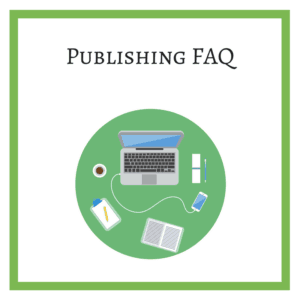Publishing FAQs
 Will you read my book?
Will you read my book?
No. I’m sorry, but that’s not possible.
If you’re looking for free feedback, your best bet is to find readers in your genre. These should be people who love your genre and read tons of books in that genre. Ask for their thoughts: what did they like? Where did they skip ahead? Were they confused at any point?
Should I finish my manuscript or can I pitch an idea to a publisher?
Yes, you should finish your manuscript, especially if it’s fiction. Sometimes nonfiction will sell when it’s not complete, but for new authors, publishers usually want to see the whole thing.
Should a publisher charge me money to publish my book?
No! If a publisher asks you for money you should be vary wary. There are tons of shady businesses out there that make it a practice to gouge authors who haven’t done their research. Legitimate publishers don’t charge you to edit or print your manuscript. If you decide to self publish, you will have to pay for some costs up-front, like a cover, editing, and possibly formatting and ads, all depending on your skill-set, but your costs should be in the hundreds, not the thousands, of dollars.
How did you get published?
I started writing years ago–in the Dark Ages before ebooks! I sent query letters to agents back in 2003/2004 because that was the only way to go then. It took me about a year to find an agent. We signed a contract saying that she would represent me, then she sent my book out to the larger publishers. It took about a year to hear back from an interested publisher, Kensington. They bought the rights to publish the first books in the series. Since my agent handled the deal, she gets 15% of all my royalties on those books forever, even if I end our agreement. She is the “agent of record.” About a year later, the first book came out in 2006. Traditional publishing moves slowly! Pre-production for the big houses takes about a year. So from looking for an agent to published book took about 6 years.
How did you get into self-publishing?
About 2010, I heard about self-publishing and decided to give it a try. I wrote a new book in a new series (On the Run series). I owned all rights to the work, so I could publish it myself.
How did you learn about writing and self-publishing?
I read books, went to conferences, and listened to podcasts. Here are my favorite writing and publishing resources:
Podcasts about Writing and Publishing:
- Wish I’d Known Then . . . For Writers--a podcast I co-host with Jami Albright. We interview authors about lessons learned from both their mistakes and their successes.
- The Creative Penn Podcast–a great resource for writing/marketing information.
- The SPA Girls Podcast (Self Publishing Authors Podcast)–great source of info writers who are just starting their publishing journey.
Podcast interviews I’ve done with info on cozy mysteries, publishing, and writing:
- Rebel Author Podcast interview about writing a series — different types of series, how to end a series or extend a series, as well as tips for marketing a series.
- Kobo Writing Life Podcast interview about writing mysteries, why readers love cozies and how I got into independent publishing.
- The Joys of Binge Reading with Jenny Wheeler interview about why I love writing about the 1920s, how being a military spouse influenced my decision to write my first cozy series, and locations that have inspired my novels.
- Book Faces Live with Nathan Van Coops interview about cozy mysteries, writing, and research. (Facebook Live video)
- The SPA Girls Podcast interview about writing cozy mysteries, marketing, and publishing.
- Smarty Pants Book Marketing Podcast interview about how authors can use Pinterest as bonus content for readers.
- Scott King’s Creator’s Cast podcast interview about writing mysteries and marketing them.
- Story Works Round Table podcast interview on cozy mysteries.
- Story Works Round Table podcast interview on plotting mysteries.
- Rocking Self Publishing Podcast interview about writing and publishing.
Courses/Books:
- How to Outline a Cozy Mystery Workbook — my book about writing a mystery with all my tips
- How to Write a Series — my book on the different types of series and the pros and cons of each
- Alida Winternheimer’s The Story Works Guide to Writing Characters.
- David Gaughran’s Let’s Get Digital.
- James Scott Bell’s Plot and Structure.
- Debra Dixon’s GMC: Goal, Motivation, Conflict.
What is a hybrid author?
Hybrid is a term used to describe someone who publishes both traditionally and indie publishes. I did this when I wrote the Ellie books for Kensington while also self-published other series.
What are the benefits of going with a traditional publisher?
That’s a big topic! Check out this article I wrote for the Alliance of Independent Authors about the benefits and drawbacks of being a hybrid author: The Pros and Cons of Being a Hybrid Author.
Which is better, trad or self-publishing?
Both trad and indie publishing have pluses and minuses. Each person has to make the decision for themselves. Keep researching publishing options as you work on polishing your manuscript so that you’re well-informed before you make a decision.
